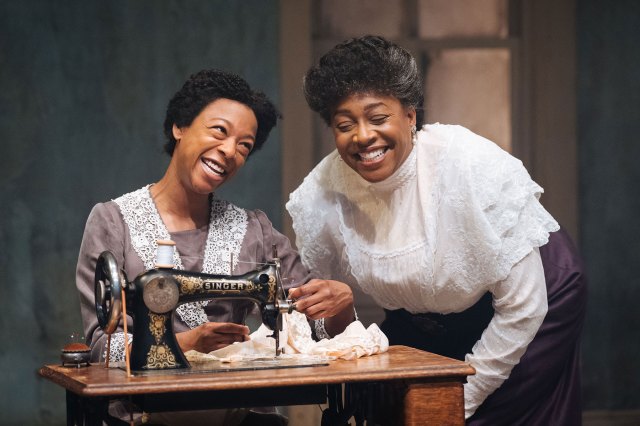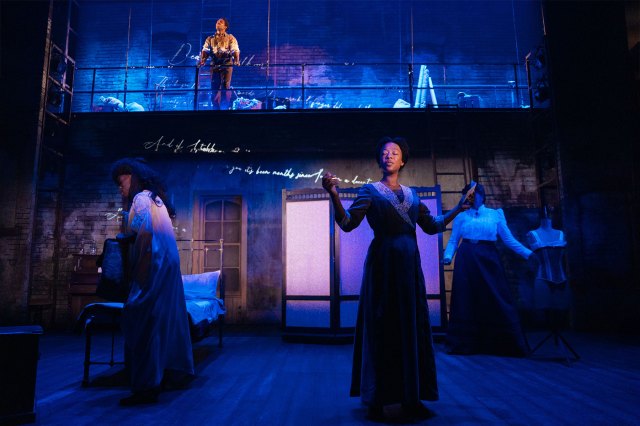Intimate Apparel with Samira Wiley at Donmar Warehouse – review
Lynn Nottage’s drama, directed by Lynette Linton, runs until 9 August

Lynn Nottage’s Intimate Apparel is about fabric, its texture, feeling and effect. And she has fashioned a play where a delicate embroidery of words creates a rich tapestry that envelops an audience in the strands of its storytelling.
Powered by an astonishing central performance by Samira Wiley (of The Handmaid’s Tale and Orange Is the New Black fame) and directed by Lynette Linton with magical delicacy, this production is both compelling and utterly beautiful.
Written in 2003, the story was inspired by Nottage’s discovery of a photograph of her great-grandmother, who had worked as a seamstress in New York at the turn of the 20th century. From that, she builds a picture – part real, part imagined – of the society in which these Black women lived and worked.
Her heroine is Esther (Wiley), quietly sewing in a boarding house in 1905, resolute, shy and supremely skilled in creating intimate apparel – the finely embroidered corsets and undergarments worn by rich women of the time. Her talent gives her a degree of economic independence and freedom, but she is burdened by her sense that she is 35 and plain. She longs to find a husband.
Out of the blue, she starts to receive letters from George Armstrong, a Caribbean labourer on the Panama Canal, whose words begin to seduce her. Esther cannot read, so she conducts the correspondence through her network of friends and acquaintances: worldly-wise landlady Mrs Dickson (Nicola Hughes), beautiful Mayme (Faith Omole), a talented musician who has turned to prostitution, and Mrs Van Buren (Claudia Jolly), a white society hostess locked in an unhappy marriage thanks to her inability to have a child.
In Alex Berry’s simply effective design, Kadiff Kirwan’s marvellously magnetic George appears on a balcony above Esther’s head; his letters to her are beamed across the wall, words full of love and hope. Jai Morjaria’s rich lighting bathes Esther in colour as she listens, rapt.
But that space, reached by ladder, is also where the Jewish tailor Mr Marks (Alex Waldmann) conjures reams of cloth from far-off places, each containing their own story of work. His Orthodox beliefs prevent him from even touching Esther; he too must entice her with words, so a bolt of silk becomes a tale of shimmering possibility, winding her in its caress.

In some ways, the tale unfolds in predictable ways. But it’s the intensity and delicacy of the writing, mirrored by Linton’s almost magical ability to create atmosphere in a production, that makes it feel so special. Each of these relationships is as complicated as a piece of beading, threaded together by thin strands of trust. Each is entirely believable. As they develop and change, the audience leans in, gently vocal in its hopes.
There’s an astonishing moment when Waldmann’s gentle, endearing Mr Marks just trails his hand behind Esther as she floats away, wrapped in the lace he has given her and the audience actually sighs, expressing the longing he feels. When Mrs Van Buren describes her husband spitting at her, there’s a sharp intake of breath and anger.
Even in a space as small as the Donmar, it’s rare to find this level of engagement with a play. Nottage’s triumph is in making these women, lost in history, have lives that matter and engage. All the performances are sensitively detailed, full of thoughts unsaid as well as said. Hughes is sharply humorous as Mrs Dickson, awake to the ways of the world, her upright, bossy manner concealing depths of affection and pain. Omole and Jolly switch moods on a sixpence.
But it’s Wiley who holds the heart of the play, and she does so with remarkable subtlety. Her Esther is both innocent and resourceful, a woman who dreams of owning a beauty parlour where Black women can be treated like queens and is prepared to work until she fulfils her ambition. She’s a mass of contradictions, constantly embarrassed when her friends tease her about sex and love, yet so full of longing it seems to consume her.
Her downturned eyes, her little flicks of the hand, the way she smooths her skirt, and above all the smile that very occasionally spreads across her face, all convey a woman trembling on the brink of something, determined not to let go. It’s a performance full of the tension and loveliness that Esther and Mr Marks find in a sumptuous piece of Japanese silk – a great portrayal in a truly entrancing play.















